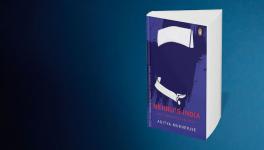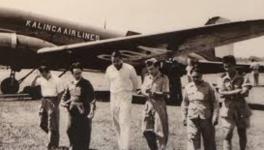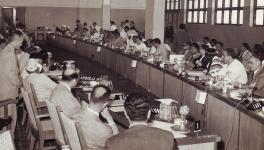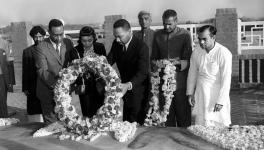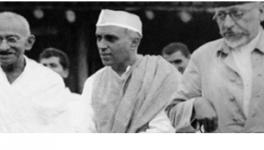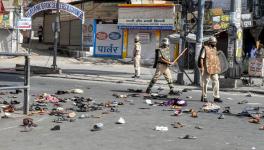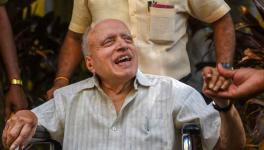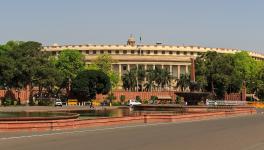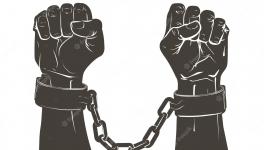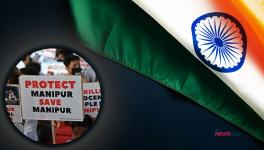Golden Freedom: Legacy of Independent India’s First Hockey Olympic Gold in 1948
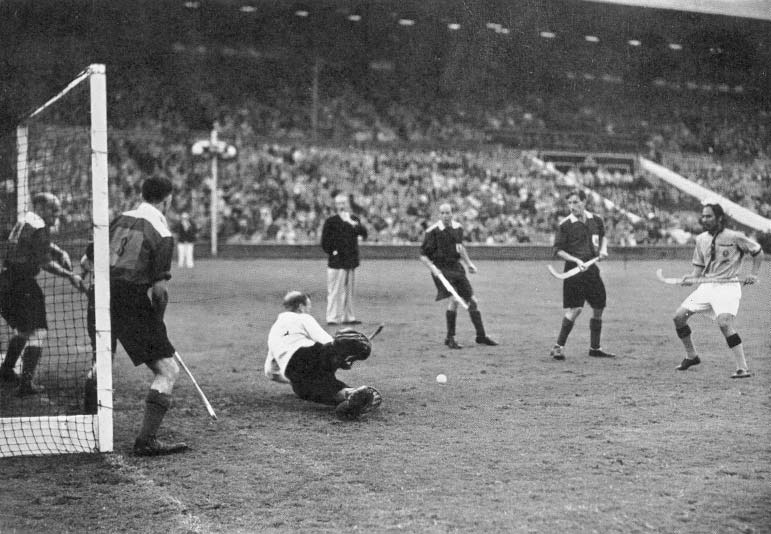
Indian hockey team, talented and one of the favourites for gold at the 1948 London Olympics, didn't have it easy as the damp and muggy conditions in England didn't suit their free-flowing style of play (PIC: Wikimedia)
In the days before national dailies became marketing space for telephone companies, the front page of The Times of India meant something. Their front page on August 13, 1948 had several news items worthy of concern -- key among them, for the newly-independent country, was the story headlined ‘Defence Research plan for India. British Scientist to advice Ministry: Delhi Talks’.
The headline that held prime position though -- left column, under the masthead -- was about Olympic hockey. By modern-day headlining trends, it read unbelievably dull. ‘INDIA TRIUMPHS IN OLYMPIC HOCKEY’ it simply read. Reuters’ correspondent, Alex Valentine’s superbly analytical match report followed. The Hindustan Times, then a weekly, decided to not overplay this unique first for independent India. They led with ‘H.M.G. withdraws Army officers from Hyderabad’ (Even the Indian Express focussed on Hyderabad’s rising troubles for the day’s lead). Their second lead, mistakenly -- or deliberately, tongue firmly ensconced in cheek -- focussed on how, ‘India retain World Hockey title’.
In a chaotic opening year of independent India, a better anniversary gift could not have come by. Make no mistake, the Hindustan Times were right. India had always been Olympic hockey champions. They won gold in 1928, 1932 and 1936 and blew away opposition in such determined manner, that the British, colonial masters of the country at the time, refused to enter their own team, fearful of a whipping.
Also Read | Indian Batsmen Refuse to Leave at Lord’s, Get Forced Out by England
But those teams had competed under the ‘Star of India’ flag, and the anthem played at the medal ceremony was not written in Bangla. All of this gathered importance in the context of 1948, and even if the editorial heads of the big newspapers of the day missed it (hindsight is a gift after all), the Prime Minister of the country hadn’t.
Even years after that momentous victory, Jawaharlal Nehru remembered its significance, and impressed upon forward Balbir Singh Sr. its importance. “Many years later, I was invited for the launch of the Bhakhra Nangal dam, and there he told me, that it was important that we kept winning on the world stage. ‘Tell all your teammates’, he said, ‘India needs this badly’.”
The stark contrast in the geographical tensions between the two finalists was highlighted by the absurdity of the fixture at the 1948 Olympics in London. The newly formed British Hockey Federation recruited all four countries to play under the Great Britain flag. India and Pakistan -- a year after separation and with federations, teams and families in disarray -- were drawn in a manner, to meet each other in the final.
Hockey’s Split Soul
Sport, Nelson Mandela famously said, has the power to change the world. It has the power to inspire. They are oft repeated lines, and yet the significance rarely diminishes. Mandela orchestrated a sporting inspiration when he came to power in South Africa in the 1990s.
In 1948, Nehru had other pressing matters to attend to, dealing with the after effects of partition chief among them. Sport was placed, gently, on the backburner. And yet, even in sport the effects of division, were for all to see. Partition did to sport, what partition did to families. It tore the soul of a country apart. It tore the soul of Indian hockey apart.
Also Read | Indian Women’s Hockey Team Yawns Short of Goals, History at World Cup
“In 1947, the core of the team came from motley clubs like Brothers (Lahore), Spartan (Rawalpindi), Independents (Delhi), Lusitanians (Mumbai), Youngsters (Lucknow), besides institutions and states. These clubs had players of every creed, region and religion. Partition shook everything up,” says K Arumugham, a hockey historian. Suddenly teammates were opposition. The worst hit, were the players from Punjab.
United Punjab was a bastion for world hockey, much less Indian hockey. In April 1947, Punjab province won the National Championships in Bombay, their second straight triumph. Balbir was the highest scorer both years, but distinctly remembers coming back to Lahore in the train and feeling the tension among the supporters and his teammates. A few months later, Balbir’s wife’s side of the family were forced to the Indian side, their property forfeited.
Those were the least of their losses. Friendships cultivated over decades were snapped by a line drawn on a map. The unprecedented violence would shock Balbir, not least because as an officer in the Punjab Police he would visit the scenes of some of the worst atrocities later that year.
Also Read | Democratic Structure in BCCI Reforms Weakened by SC Order: Justice Lodha
“Naturally, in these circumstances, hockey was far from people’s mind, but the IHF [Indian Hockey Federation] had done a lot of good work leading to the Olympics,” Arumugham says, “And all of it came undone because of the division of talent.”
It took close to a year, but by the time the next Nationals came around, East Punjab was a shadow of itself at the Nationals. Most teams across the country had suffered, but none more than East Punjab. A new list of probables was drawn up to compete at the London Olympics. Initially, Balbir’s name was omitted from the list, but after some hand wringing and media pressure, he won his ticket.
Golden Nation
Next stop, London. The team was formidable. So formidable, in fact, that the legendary Leslie Claudius, India’s most medalled Olympian, then a 20-year-old, warmed the bench for the majority of the tournament.
Also Read | Mind Over Drop Shots: PV Sindhu’s Real Challenge Beyond Carolina Marin
In 1948, Balbir was Balbir Singh, the ‘senior’ an addition made in 1968 when three more Balbir’s joined the hockey team. And Balbir was the bedrock of the Indian forward line. He scored six goals in a preliminary match against Argentina which India won 9-1. But he was promptly dropped for the next game to help other players get game time and therefore a medal (those days, only players who had featured in the playing XI won medals, squad members missed out).
To hear the tale now, it may seem that India won the gold at a canter, but the truth was far from it. Minus Balbir, and playing in conditions that didn’t suit their style of play, India barely edged out Spain 2-0 in the quarterfinals, and the Netherlands 2-1 in the semis.
“Before our first game at the Olympics, I met my former police chief from Punjab, Sir John Bennett, and he told me the grounds in England were very different,” Balbir recalls. “He said that the ground is slow, and wet, and so I must not wait for the ball, and instead run for the ball.”
Also Read | England Win. India Lose. Test Cricket Gasps for Air
Their slick, interpassing game had served them well in the preliminary stages, but as the Games went on, the weather deteriorated. Afternoons were muggy and followed by rain. The wet pitch inhibited stick work and the heavy conditions suited the European opposition.
Pakistan would succumb to these problems and lose to Great Britain in the semi-finals. Where everyone had expected the first chapter of a long and glorious rivalry, they were served instead the master vs independent nation narrative. It wasn’t the game the Games wanted, but was the game the London Games deserved. India vs Great Britain at Wembley.
Valentine of Reuters laid bare the facts in his preview for the final. ‘The Indians,’ he wrote, ‘want hot sunshine for the next two days. The British want rain, or at least no heat’.
Unlike this lot, Balbir’s Indian team took steps to counter the off chance that they would face rain. The team cancelled practice prior to the final and instead chose to focus’ on the tactics against the British style of play.
Also Read | Gautam Gambhir, Virender Sehwag in DDCA’s New Conflict of Interest Controversy
Neither the faint drizzle, nor a pitch made muddy by the staging of a third place game prior to the final (protested by the Indian officials), could stop the Indian team. Balbir scored two. India scored four.
What followed was pandemonium, even by modern standards. The team had secured independent India’s first ever Olympic medal and so dinners and felicitations at High Commissions were in order. Soon after they embarked on a victory tour of Europe. Friendlies were played in Germany and Czechoslovakia. When they returned via ship to Bombay, low tide prevented an immediate docking. When they did dock, they were quickly shuttled to Delhi and played an exhibition game at the National Stadium in front of 70,000 people, among them Nehru and India’s soon to be first President, Rajendra Prasad.
The lag at present
The aftermath of 1948, and the collective superiority it gave Indian hockey would endure for the next three decades. In subsequent interviews, Leslie Claudius -- who won two more golds (‘52, 56) and a silver (‘60) -- blamed the lack of foresight among the administrators that led to a rot in Indian hockey in subsequent decades. From the kings of the ‘50s, India’s tables turned at the millenium. When the Games revisited London in 2012, India finished 12th and last in the competition.
In one of his final interviews with Sports Illustrated India, before his demise in December 2012, Claudius said, “You need to have a sense of history and a sense of pride. But then you should not rest on history and dream about what has been. You have to move forward too.”
Also Read | What Indian Sports Stars Can Learn From Socrates
India’s last Olympic gold-winning captain from 1980, V Baskaran concurs. “The team of 1948 provided a platform and a standard for everyone else to follow,” he says. “Despite personal tragedy, organisational chaos and even adverse conditions, they adapted and started what was, in our childhood, a hockey revolution. Sadly, the game changed, but we didn’t.”
Hockey is an unrecognisable sport now. The audience at the 1948 Wembley final would find modern hockey’s lack of individual skill, and its focus on collective responsibility, too blase. Modern hockey is bauhausian in nature, a far cry from the ornamentation that men like Kishan Lal, Patrick Jansen and Balbir Singh Sr. brought in a 70-minute game.
And yet, it was collective responsibility that won them the day. From the camaraderie that gave 20 Indians a chance to pack off a gold medal, the intelligence to alter their style of play to suit the conditions, or even adhering to the absurdity of taking in a long tour immediately after an Olympics, the 1948 team was gold standard. In more ways than one. To start off, maybe these boys can learn some lessons.
Get the latest reports & analysis with people's perspective on Protests, movements & deep analytical videos, discussions of the current affairs in your Telegram app. Subscribe to NewsClick's Telegram channel & get Real-Time updates on stories, as they get published on our website.









